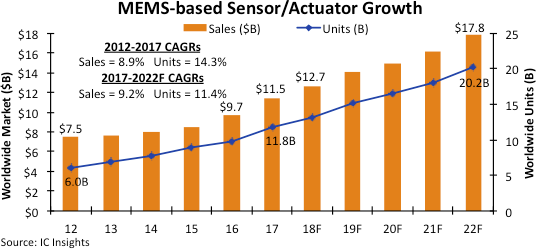Products built with microelectromechanical systems (MEMS) technology are forecast to account for 73% of the $9.3 billion semiconductor sensor market in 2018 and about 47% of the projected 24.1 billion total sensor units to be shipped globally this year, according to IC Insights’ 2018 O-S-D Report—A Market Analysis and Forecast for Optoelectronics, Sensors/Actuators, and Discretes. Revenues for MEMS-built sensors—including accelerometers, gyroscope devices, pressure sensors, and microphone chips—are expected to grow 10% in 2018 to $6.8 billion compared to nearly $6.1 billion in 2017, which was a 17% increase from $5.2 billion in 2016, the O-S-D Report says. Shipments of MEMS-built sensors are forecast to rise about 11% in 2018 to 11.1 billion after growing 19% in 2016.
An additional $5.9 billion in sales is expected to be generated in 2018 by MEMS-built actuators, which use their microelectromechanical systems transducers to translate and initiate action—such as dispensing ink in printers or drugs in hospital patients, reflecting light on tilting micromirrors in digital projectors, or filtering radio-frequency signals by converting RF to acoustic waves across structures on chips. Total sales of MEMS-built sensors and actuators are projected to grow 10% in 2018 to $12.7 billion after increasing nearly 18% in 2017 and 15% in 2016 (Figure 1).
In terms of unit volume, shipments of MEMS-built sensors and actuators are expected to grow by slightly less than 12% to 13.1 billion units worldwide after climbing 20% in 2017 and rising 11% in 2016. Total revenues for MEMS-based sensors and actuators are projected to increase by a compound annual growth rate (CAGR) of 9.2% between 2017 and 2022 to reach $17.8 billion in the final year of the forecast, according to the 2018 O-S-D Report. Worldwide shipments of these MEMS-built semiconductors are expected to grow by a CAGR of 11.4% in the 2017-2022 period to 20.2 billion units at the end of the forecast.
One of the biggest changes expected in the five-year forecast period will be greater stability in the average selling price for MEMS-built devices and significantly less ASP erosion than in the past 10 years. The ASP for MEMS-built sensors and actuators is projected to drop by a CAGR of -2.0% between 2017 and 2022 compared to a -4.7% annual rate of decline in the 2012-2017 period and the steep CAGR plunge of -13.6% between 2007 and 2012. The ASP for MEMS-built devices is expected to be $0.88 in 2022 versus $0.97 in 2017, $1.24 in 2012, and $2.57 in 2007, says the 2018 report.
The spread of MEMS-based sensors and actuators into a broader range of new “autonomous and “intelligent” automated applications—such as those connected to the Internet of Things (IoT) and containing artificial intelligence (AI)—will help keep ASPs from falling as much as they did in the last 10 years. IC Insights believes many MEMS-based semiconductors are becoming more specialized for certain applications, which will help insulate them from pricing pressures in the market.























